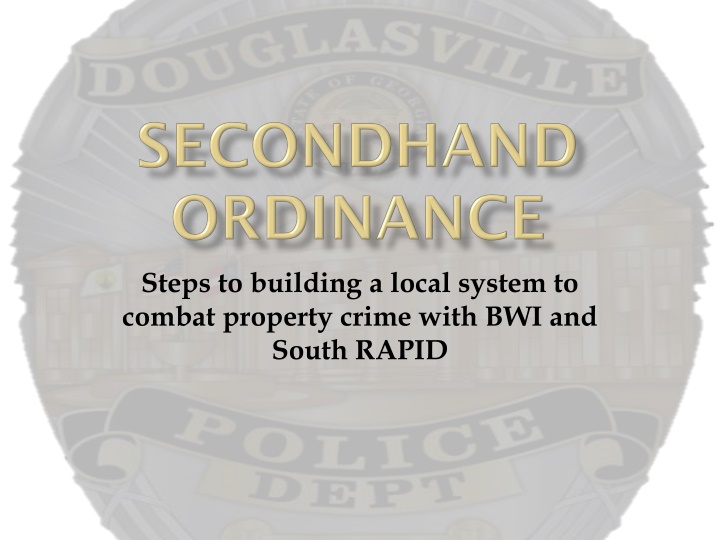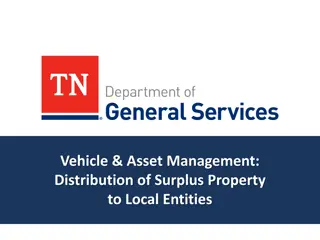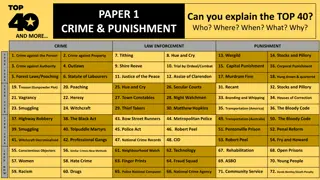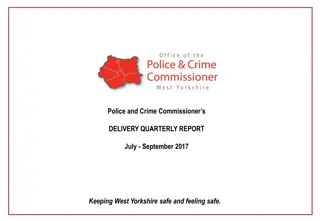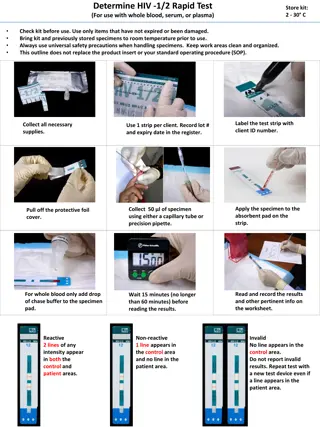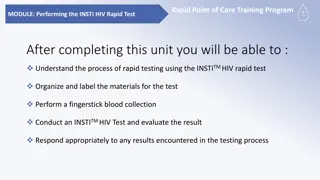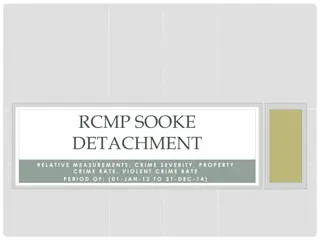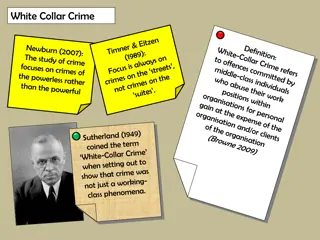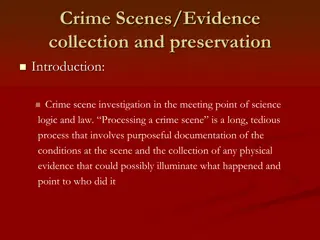Building a Local System to Combat Property Crime with BWI and South RAPID
City residents and law enforcement are facing challenges with property crime, pawn backlogs, and no budget allotment. The area's economy downturn has increased the value of secondhand items, leading to an urgency in combatting theft. The system aims to address various types of theft, including armed robbery, shoplifting, and fraud, through a strategic approach and electronic reporting medium selection process.
Uploaded on Sep 07, 2024 | 5 Views
Download Presentation

Please find below an Image/Link to download the presentation.
The content on the website is provided AS IS for your information and personal use only. It may not be sold, licensed, or shared on other websites without obtaining consent from the author.If you encounter any issues during the download, it is possible that the publisher has removed the file from their server.
You are allowed to download the files provided on this website for personal or commercial use, subject to the condition that they are used lawfully. All files are the property of their respective owners.
The content on the website is provided AS IS for your information and personal use only. It may not be sold, licensed, or shared on other websites without obtaining consent from the author.
E N D
Presentation Transcript
Steps to building a local system to combat property crime with BWI and South RAPID
City residents 32,000 County residents 136,000 Located 20 miles west of Atlanta Major interstate and Mall Sworn law enforcement 94 7 pawn shops Pawn tickets backlogged 6-9 months No pawn or secondhand ordinance No budget allotment for pawn
Consignment Pawn Classified/Online Thrift/Antique/Clothes ATM style Storefront Person to person 3 main differences: When you relinquish ownership When you are paid Who sells/buys the item
Gas stations Jewelry stores Electronics retailers National chain retailers Cexchange Computer repair Cell phone repair Sporting goods Tire stores Antique stores Coin dealers Video game stores
Downturn in economy has increased value of secondhand to all retailers Pawn remains high but declining to other areas Urgency of sale remains primary motivation Local plus 1 is still primary trade area Internet based fencing transactions are not traditional pawner 3 distinct groups, Internet, local sellers, fraud Electronic documentation is not a deterrent alone Dollar amounts of thefts increasing
Theft with restitution for recyclers Theft by conversion of rental property Multi-state offenders Armed robbery and smash and grab Shoplifting to clothing and baby stores Forgery/fraud Chinese gold jewelry, and silver coins Car titles, MV1 end of life documents
Choosing an electronic reporting medium in a competitive bid process 3 types available: web based, program based, direct Testing all competitive bidders in local stores Gathering the results and presenting results Using results to create ordinance Determining procedure for license, permits and related departments Set-up and training with businesses
Website, Private or custom built Cost per transaction or flat fee Tax on business license Yearly fee paid by the viewing agency Cost of software and tech support Training for private business and law enforcement Effect on business Public acceptance Equipment cost to business
Cost of reporting low to business Server is located within law enforcement agency Policy and procedure for employees and users, consistent with agency S.O.P. Time and date stamped transaction information Real time transaction reporting Ease of use for business and agency Training and support for business and agency Provided highest level of data fields available Provides redundant NCIC checks without upload Data belongs to agency 100% Backup procedure defined Documentation of seizures
Low cost comparative to other structures Removes bias based on tax revenue with elected officials Removes bias with officer or administrator Low cost for smaller business Agency does not enforce fees only reporting Encourages smaller businesses to report transactions due to low cost
Real Time reporting requirement is a key benefit and requirement of ordinance Quality of data is higher Time and date stamps support case Additional evidence value of pictures of suspects and prints Enforcement is instantly verifiable with UC or observation No backlog of data or lost entries Daily status checks of business Meets or exceeds expectations for prosecution
Define Identification procedure Define store permit requirement to actual staff working in store Define employee permit requirement Define revocations, appeals and suspensions of permits in combination with business license Define unlicensed business penalties Fixed physical location is a necessity No temporary or short term permits
Define completely the ID requirement: The secondhand dealer shall require all persons selling secondhand items to him to show proper identification prior to conducting a secondhand dealership transaction. Proper identification is defined as a government-issued photo identification card such as a driver's license, military identification card, state identification card, not expired or issued in temporary status. Define completely description of items to be taken: the manufacturer, model, serial number, style, material, kind, color, design, karat, number of stones if jewelry, and all other identifying names, marks, and numbers.
Define completely all data fields to be required: The secondhand dealer shall also document the name, address, telephone number, race, sex, height, weight, driver's license number, date of birth, and social security number of the person selling the secondhand items, along with the date and time of transaction. This documentation shall be made at the time of the transaction.
Define completely the picture requirements: A digital photograph shall be made by the dealer or employee at the time of acquisition of any regulated secondhand item of the item's serial number, which number shall be clearly visible and readable in the photograph if imprinted on the item. If the item was never imprinted with any type of serial number, then the photograph shall show the entire item. All such digital photographs shall be submitted to the automated reporting system. Further, a digital photograph of the seller's face, similar to those on accepted identification, shall be made at the time of each and every acquisition and submitted to the automated reporting system. The photograph shall clearly show a frontal view of the seller's face along with the secondhand dealer's ticket transaction number. Digital images shall be labeled and stored in such a manner that they are safe from corruption, readily identifiable, and readily available for review
The secondhand dealer shall obtain from each seller the fingerprint of the right hand index finger, unless such finger is missing, in which event the print of the next finger in existence on the right hand shall be obtained with a notation as to the exact finger printed. The electronic digital fingerprint scanner will be the primary method of entry required. The fingerprint shall be imprinted onto the transaction form in the designated area along with the signature of the seller. The fingerprint must be clear and legible. In the event that more than one transaction form is required, a fingerprint and signature shall be obtained for each form. Fingerprints and the information required herein shall be obtained upon each occasion of acquisition.
The secondhand dealer shall store the above records, digital images, and fingerprints for a period of four years and make them available to law enforcement upon request. Every secondhand dealership shall enter each transaction as it occurs into the electronic automated reporting system via the internet to the administrator of the electronic automated reporting system. The administrator of the electronic automated reporting system will electronically transmit all transactions to the city police department.
Disposition of articles or goods. Any secondhand dealer who acquires nonexempt regulated secondhand items shall hold them for at least 30 days, or longer if directed by the police department, before disposing of same by sale, transfer, shipment or otherwise. All property and/or titles must be kept on the premises. These secondhand items will be maintained in an area not accessed by customers
In the event that the electronic automated reporting system becomes temporarily or permanently disabled, secondhand dealerships and secondhand dealers will be notified as soon as possible. Secondhand dealerships that incur electronic system failures or other events that would cause partial or complete loss of electronic reporting should notify the police department forthwith with the reason of the failure. In this event, the secondhand dealers will be required to make records of transactions on paper forms. A digital camera will be used to collect the required pictures and transferred to a CD for submittal. The paper forms must include information as enumerated in this article. Secondhand dealers shall maintain a minimum three-day supply of these paper forms. On a daily basis, all transactions not reported in electronic automated reporting system, will be delivered to the police department by the secondhand dealership within two hours of the end of the business day for every day until the event has been corrected.
POLICE PERMIT APPLICATION BUSINESS LICENSE
Must be completed prior to business opening or business license withheld 2 hour meeting with business and employee Provide ordinance, state law, and verify operation of Rapid south with test transaction Verify management contacts and ability to verify transactions Can be scheduled for retraining as needed
Open contact policy with businesses Maintain a documentation file for each business of errors to be addressed Fines or penalties must be sufficient to deter violations Consistent standards for all businesses for violations Prosecution of incidents for business when provided with complete documentation
Due to reporting requirements, Georgia state law on recycling now includes electronic reporting Electronic reporting has spread from 3 (2009) jurisdictions to 18 (2014) around the Atlanta metro area Increased awareness to the issues of secondhand
Chief Chris Womack womackc@douglasvillega.gov Det. Mac Abercrombie abercrombiem@douglasvillega.gov 678-293-1707
